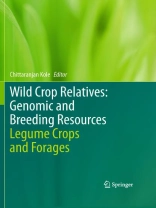Wild crop relatives are now playing a significant part in the elucidation and improvement of the genomes of their cultivated counterparts. This work includes comprehensive examinations of the status, origin, distribution, morphology, cytology, genetic diversity and available genetic and genomic resources of numerous wild crop relatives, as well as of their evolution and phylogenetic relationship. Further topics include their role as model plants, genetic erosion and conservation efforts, and their domestication for the purposes of bioenergy, phytomedicines, nutraceuticals and phytoremediation. Wild Crop Relatives: Genomic and Breeding Resources comprises 10 volumes on Cereals, Millets and Grasses, Oilseeds, Legume Crops and Forages, Vegetables, Temperate Fruits, Tropical and Subtropical Fruits, Industrial Crops, Plantation and Ornamental Crops, and Forest Trees. It contains 125 chapters written by nearly 400 well-known authors from about 40 countries.
Inhoudsopgave
Arachis; Cajanus; Chenopodium; Cicer; Glycine; Lathyrus; Lens; Lotus; Lupinus; Medicago; Phaseolus; Pisum; Trifolium; Vicia; Vigna.












